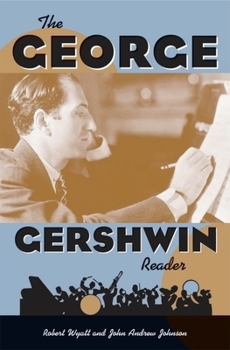The George Gershwin Reader
Select Format
Select Condition 
Book Overview
George Gershwin is one of the giants of American music, unique in that he was both a brilliant writer of popular songs ("Swanee," "I Got Rhythm," "They Can't Take That Away From Me") and of more serious music, including "Rhapsody in Blue," "An American in Paris," and "Porgy and Bess." Now, in The George Gershwin Reader, music lovers are treated to a spectacular celebration of this great American composer.
The Reader offers a kaleidoscopic collection...
Format:Hardcover
Language:English
ISBN:0195130197
ISBN13:9780195130195
Release Date:February 2004
Publisher:Oxford University Press, USA
Length:354 Pages
Weight:1.45 lbs.
Dimensions:1.2" x 9.5" x 6.3"
Customer Reviews
3 ratings
A Must Read For Any Gershwin Fan
Published by Thriftbooks.com User , 14 years ago
This is a must-read for any fan of Gershwin's music and anyone who wants to know more about the man. The items have been brilliantly selected. Some of my favorites: a description of Gershwin by his sister, a magazine article from 1939 by Oscar Levant in which the famous musician/wit gives a perceptive and anecdote-filled portrait of his friend, and a letter by Gershwin to his mother written just prior to his death. Probably most interesting of all are interviews conducted by Robert Wyatt with Todd Duncan (the first Porgy) and Anne Brown (the first Bess). In these interviews, the two singers, speaking from the vantage point of more than fifty years, talk with candor and affection about the George Gershwin they knew.
Gershwin to the core
Published by Thriftbooks.com User , 19 years ago
As compiled by Robert Wyatt and John Andrew Johnson, George Gershwin springs to life in this book as much as his music. Told from the inside out, the authors allow Gershwin, his contemporaries and those who followed him to create a picture of the composer and how he lived and breathed music every day. This is a beautiful book. Chief among the contributions in "The George Gershwin Reader" are letters between Gershwin and those with whom he came into contact. We read Gershwin's letters describing how he composed, reactions from him to those who challenged his compositions (especially questions about his own orchestrations) and his eternal boyishness as he wrote friends and family regarding his daily pleasures. His early demise only strengthened the views of so many that Gershwin was a musical genius and that he, more than any other composer, captured the essence of America in transition between the two world wars. Although "The George Gershwin Reader" can occasionally get overly detailed in musical theory, the pages flow easily. The brief summaries that the authors give before each numbered entry are most helpful for explanation in setting the stage for what ensues. The timeliness of Gershwin's life mirrored by these entries is the authors' best contribution. It is easy to see why, more than eighty years after George Gershwin's first big success, "Rhapsody in Blue", his music has so long endured and is so endeared. This book is a great tribute to Gershwin and one I hope other readers will enjoy thoroughly.
Both informative and enjoyable reading
Published by Thriftbooks.com User , 20 years ago
Having four biographies of George Gershwin (GG) already in my collection, I wondered if something called "The George Gershwin Reader" would be of any value. I needn't have wondered! Reading it cover to cover has been one of the more pleasant tasks I have encountered as a reviewer. This Oxford University Press book retails for $30. Edited by Robert Wyatt and John Andrew Johnson, it is organized into eight sections: Portraits of the Artist, The Growing Limelight (1919-1924), Fame and Fortune (1924-1930), Maturity (1930-1935, Porgy and Bess, Last Years: Hollywood (1936-1937), Obituaries and Eulogies, and As Time Passes. There are 83 reading selections in all. Some are contemporary reports, essays, letters, biographies; some are backward looks written since the composer's death. In short, this can be used as a sourcebook for those studying various aspects of Gershwin's life and works (practically the same things) or read for pure enjoyment. My favorite anecdote that so wonderfully reveals the innocent egotism of GG is the story told on pp. 181-182 about a remark he made to composer Harry Ruby and his reaction to being reminded of it two years later. Priceless. Each selection is introduced by the editors, who give background information about what is to be discussed and the persons involved. There is no dearth of negative criticism about GG's "classical" compositions; and they have even included one which states that Gershwin could not have written the music attributed to him. (The implication is that no Jewish composer could have done that well, a strong echo of Wagner's identical claim, and then contradicted by the writer's claiming the music is bad anyway!) This OUP book is the very model of what a "reader" should be-and teachers and students of the history of American music, I will be making great use of the information therein. Need I add, Highly Recommended?





